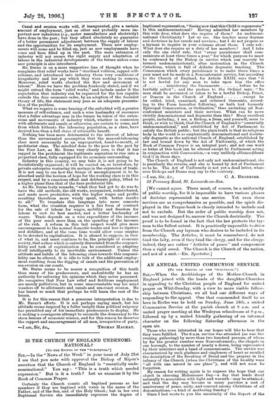IS THE CHURCH OF ENGLAND UNDENOMI- NATIONAL P
TO TDB EDITOR OP THIS "SPECTATOR:]
SIR,—In the "News of the Week" in your issue of July 21st I see that you note with approval the Bishop of Ripon's assertion that the Church of England is "essentially unde- nominational." You say : "This is a truth which needed expression." But is it a truth ? Let us examine it by the Book of Common Prayer.
Certainly the Church counts all baptised persons as her members if they are baptised with water in the name of the Father, and of the Son, and of the Holy Ghost ; but in her own Baptismal Service she immediately expresses the dogma of baptismal regeneration, "Seeing now that this Child is regenerate." Is this undenominational? Having admitted her members by this wide door, what does she require of them ? An undenomi- national Christianity? Let us see. She teaches many dogmas and doctrines in her creeds and services ; but I do not propose as a layrami to inquire in your columns about these. I only ask : What does she require as a duty of her members ? And I take only the one chief rule, that "every parishioner shall com- municate at least three times a year," for which purpose he must be confirmed by the Bishop (a- service which can scarcely be termed undenominational), after instruction in the Church Catechism, which is full of definite dogmatic teaching. The Communion which every parishioner is to make three times a year must not be made in a Nonconformist service, but according to the Church of England, for Article XXIII. says that "it is not lawful for any man to take upon him the office
of ministering the Sacraments before he be lawfully called" ; and the preface to the Ordinal says : "No man shall be accounted or taken to be a lawful Bishop, Priest, or Deacon in the Church of England except he be called, tried, examined, and ordained thereunto, accord- ing to the Form hereafter following, or hath had formerly Episcopal Consecration, or Ordination," thus excluding all Non- conformist ministers and their services. What can be more strictly denominational and dogmatic than this ? Many excellent people, including, I see, a Bishop, a Dean, and yourself, seem to think, or wish to think, that the Church of England is" essentially undenominational," and established by Act of Parliament to satisfy the British public ; but the plain truth is that no religious body in the world is so emphatically denominational and doctrin- ally dogmatic as the national Church of England, established by law and bound down by the Act of Uniformity, of which the Book of Common Prayer is an integral part; and not one word or letter of this book can be altered except by Parliament acting in conjunction with Convocation,—a very unlikely alliance (thank God !) in these days.
The Church of England is hot only not undenominational, she is peculiarly the reverse, and she is bound by Act of Parliament so to be. The Act of Uniformity is not yet a dead letter, what- ever Bishops and Deans may say to the contrary.
23 Pevensey Road, St. Leonards-on-Sea.
[We cannot agree. There must, of course, be a uniformity Of public worship, for it is impossible to have various phases of doctrine represented in one service. Yet even these services are as comprehensive as possible, and the spirit dis- played in the Prayer-book is clearly intended to include and not to exclude. But the order of public worship does not, and was not designed to, narrow the Church doctrinally. The proof is to be found in the fact that the law protects the lay- man to the fullest extent. It is practically impossible to drive from the Church any layman who desires to be included in its membership. The Articles, it must be remembered, do not bind the laity, even if they bind the clergy, and for the clergy. indeed, they are rather "Articles of peace" and compromise than a rigid creed. The Church is the Church of the nation, and not of a sect.—ED. Spectator.]






































 Previous page
Previous page